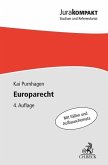Written with exceptional clarity, simplicity and precision, this short textbook provides a classic introduction to European law. Using a clear structural framework, it guides students through the subject's core elements and key issues, from the creation and enforcement of European law to the workings of the internal market. Chapters are enriched with figures and tables to clarify difficult topics and illustrate relationships and processes, ensuring that students understand even the most complex of concepts.
The second edition has been updated throughout and includes an entirely new chapter on the internal market for goods. Two new practical appendices offer suggestions for further reading and guide readers through the process of finding and reading EU Court judgments. A companion website features full 'Lisbonised' versions of the cases cited in the text, links to EU legislation, downloadable figures and textbook updates.
The second edition has been updated throughout and includes an entirely new chapter on the internal market for goods. Two new practical appendices offer suggestions for further reading and guide readers through the process of finding and reading EU Court judgments. A companion website features full 'Lisbonised' versions of the cases cited in the text, links to EU legislation, downloadable figures and textbook updates.
'Marked by the lucidity of expression, dexterity of analysis and accessibility of the first edition, this second edition brings to life this field of EU law whilst providing students with all the tools they need to understand and enjoy this complex and contested subject.' Damian Chalmers, London School of Economics and Political Science








